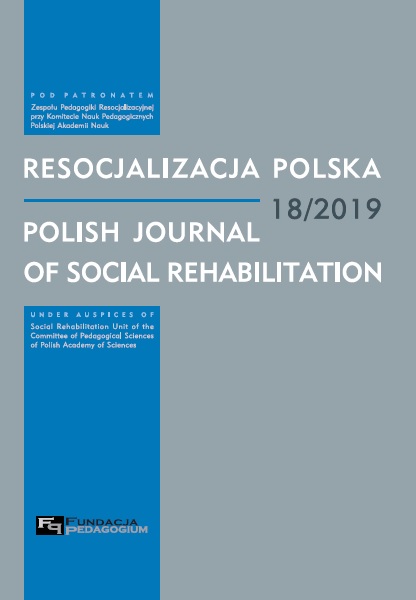Court probation – a useful function in the service for children.
Court probation – a useful function in the service for children.
Author(s): Stanisław Leszek StadniczeńkoSubject(s): Criminology, Penology
Published by: Fundacja Pedagogium
Keywords: Probation officer; service for children; human rights; probation officer’s work
Summary/Abstract: The article discusses issues related to the evolution of probation as a service to the child, considering it a variable social construct determined by various discourses. The premise of this claim is the phenomenological assumption that life is complex, undefined and based on interaction between people. “Society […] is a symbolic creation made up of concepts, their meanings and language, constantly changing through human activity, limiting and enabling it” (Parton, 2003, p. 5).The aspects of the professionalization of the probation officer’s work in the service for children are presented in relation to the complex current reality, i.e. “post”, post-truth, post-politics, post-secularism, post-humanism and post-modernism (post-modernity). The terminology reflects social change in relation to the other concepts considered. The literature deals with very widely raised issues that are related to the crisis of reality. It should be noted that it was the concept of post-truth that paved the way for the world of politics and political debate, in order to achieve triumph by being recognized as the word of the year in 2016 by the editors of the Oxford Dictionary. The matter is very complex, because the mentioned “post” replaces previous concepts with a different perception of the world and we are not sure about the direction of these changes. The inclusion of this issue in the probation officers’ work indicates their entanglement with the current reality in which they function. So it is only a signal to understand the complexity of the probation officers’ work and their function in a difficult reality. All complex environmental factors influence the way we perceive care, provision probation and other concepts.Relationships are considered to be at the core of the constructionist concept of probation as well as the adopted reflectiveness, i.e. a direct transition from knowledge to action. The main theme of the considerations is that the legal regulations contained in the principles of the Convention on the Rights of the Child occupy an extremely important place here.The term “human person” is very important, especially since it is associated with two fundamental – for thinking about human rights – categories: the dignity and value of the human person as essential properties of humanity and human subjectivity. Reflection on the service for children is by its very nature of great importance in terms of the creation of good, bringing the rights of the child and the family into effect. The law is what governs actions and human relations, hence the rule and measure of action organizing them to the purpose.The author draws attention to the relationship between the proclaimed and protected rights and the welfare of children and extremely complex social and legal issues. The understanding of the law and human rights as the basis of service thus becomes the foundation of the probation function. It seems that broadening the legal understanding to include the law as a relationship to the due state of affairs to include a philosophical understanding and the law as a personal affinity may explain the phenomenon of the rights of the child.The 60th anniversary of the Declaration of the Rights of the Child (UN 1959) and the 30th anniversary of the establishment of the Convention on the Rights of the Child (UN 1989), as well as the 100th anniversary of the probation in Poland, which evaluated over that time from the model of socio-professional probation to the professional-social one carrying out tasks of an educational and social rehabilitation, prevention, diagnostics, control nature, related to the execution of court judgments and bringing the law into effect in the environment of activity. The study deals with the beginnings of the regulation of probation and its development as well as the social role of probation officers in the context of responsibility and participation in creating order, social and legal order in society, bringing the rights of the child into effect. The analysis was carried out in the scope of realistic understanding of human being as a person, hence it was embedded in the area of human rights protection, including the rights of the child.It was considered necessary to take into account the context of philosophical anthropology, which refers to the establishment of human rights to understand man as a person, as this theory best corresponds to common sense cognition. At the same time, the organic relationship between human rights and the objective order of human nature has been taken into account, which is manifested not only in common sense cognition, but also in the historical development of this issue and in philosophical and anthropological reflection.
Journal: Resocjalizacja Polska
- Issue Year: 18/2019
- Issue No: 2
- Page Range: 11-30
- Page Count: 20
- Language: English

